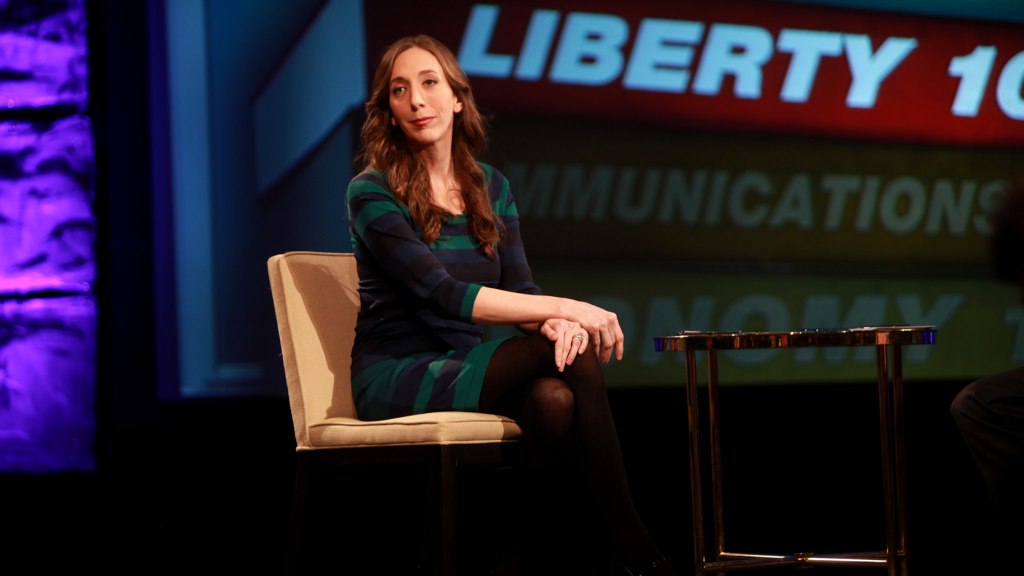On Wednesday, Reason named Katherine Mangu-Ward its new editor-in-chief, capping off an arc that began when she interned at the libertarian magazine in 2000. Washingtonian talked to the self-described Beltway lifer about Trump, the fabled libertarian moment, and her vision for the magazine.
You started at Reason full-time in 2006, and worked as an intern six years before that. How have you seen the magazine grow, and what changes can we expect from you?
In 2000, Reason‘s “DC bureau” was just one guy in a rented room on Pennsylvania Avenue–my desk was in the hallway next to the fax machine.
Reason was one of the first political rags to realize that a sassier, speedier online presence could complement the dead tree edition, but in 2000 most of the focus was still on print. Now we’re a multi-platform endeavor, and DC is our editorial HQ. The magazine’s circulation is 50,000 (print and digital) and reason.com gets 2.5 million monthly unique visitors.
As editor in chief of Reason magazine, I’ll be focusing on producing juicy, high-quality features that promote “free minds and free markets.” My hope is to present content in a way that appeals to a broad swath of readers who appreciate good storytelling, original reporting, and fresh non-partisan analysis. I’ll also be updating the look of the magazine to re-capture and modernize some of the weird, ‘zine-y energy of the early issues from the ’60s and ’70s.
Some things don’t change, though. A chunk of my summer internship was spent transcribing a fascinating long interview with a little-known Western governor who had some intriguingly libertarian ideas. That guy?: Gary Johnson, 2016’s Libertarian Party presidential nominee.
Early on, Rand Paul sparked much talk about the “libertarian moment,” only to have that talk sputter alongside his candidacy. Is libertarianism doomed to forever be an intellectual exercise of sorts, rather than the ideological backbone of a major-party nominee?
The behavior of the major parties in the 2016 race has been utterly baffling and disappointing to many people, I think, not just libertarians. They have coughed up candidates who are both deeply authoritarian and widely despised. Meanwhile, the Libertarian Party has nominated two credible, experienced politicians with actual experience governing in purple states.
I’m not a registered Libertarian Party member, and Reason is a small “l” libertarian outfit, not a party organ. But in this cycle in particular, I’m having trouble stomaching the line that “those Libertarians should really stop smoking so much weed and get serious.” When your nominee is a reality TV star with zero experience in office, you probably shouldn’t be lecturing other people about political gravitas.
On the flip side, could one argue that Donald Trump has aided the libertarian cause? He’s of course proven unacceptable to a large swath of Republican voters, sparking much more interest in the Libertarian ticket than we’ve seen in past elections. And as for the GOP, he seems to have inched the party away from the hawkish bent that’s defined it for decades. What’s the net result?
I’d love to believe that the GOP is becoming more libertarian–the general population is certainly becoming more libertarian on issues like pot legalization, gay marriage, criminal justice reform, and privacy–but my heart has been broken before. It’s funny how when one party is out of power, their representatives are all over C-SPAN making speeches about overweening executive power, waste and mismanagement, and runaway government spending. But those concerns seem to mysteriously vanish as soon as their team is back on top. Both parties are guilty, but libertarians do an especially good impression of Charlie Brown with the football when it comes to the Republican Party.
Gary Johnson: valuable voice for the Libertarian Party, or just better than those other two on the ticket?
Both!
Reason has more financial freedom than other publications, thanks to its foundation and other grants. How does that affect your editorial choices?
Magazines in our category don’t, as a rule, operate in the black. We are lucky to have a rather diverse cast of supporters who think high-quality journalism with a free market bent is important enough to help us keep the lights on. Having donors who share our mission of promoting choice and individual liberty means that (even though subscriptions, reach, and traffic are important to us) we are less tempted than some of our competitors to pad out our real content with clickbait slideshows of puppies in wet T-shirts.
Our donors also makes it easier for us to give away our work for free, because a big part of our mission is just getting libertarian ideas out there.



















